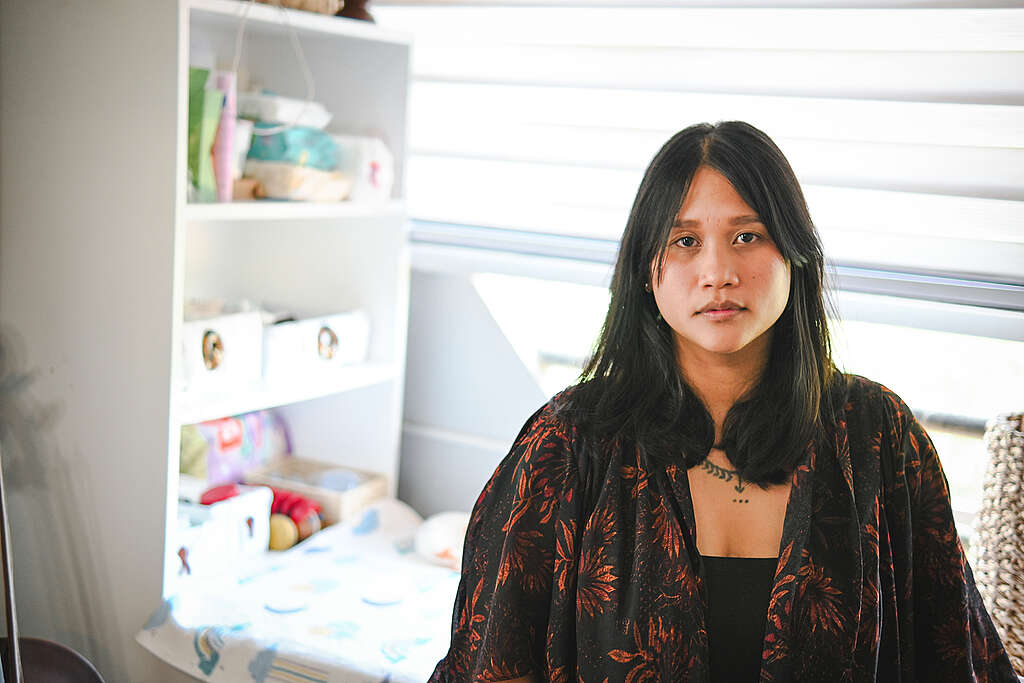Navigating an uncertain future amidst the climate crisis

In a world defined by a worsening climate crisis, Joanna Sustento, a new mother from Tacloban City cradling her recently-born son, grapples with the profound emotional tug-of-war that many individuals face today—the anxiety of raising a child in a world overshadowed by environmental uncertainty.
What kind of planet will the future generations inherit when the climate crisis hits its peak?
Recent studies point to this palpable concern. In 2022, a global survey revealed that the Philippines has the highest number of young people experiencing high levels of anxiety and negative emotions related to the climate crisis. Moreover, a study by The Lancet, a science and health journal, showed that Filipino children are among the most stressed in the world by climate change.
“I felt guilty, lalo na sa panahon ngayon with the climate crisis. Iniisip ko, hindi ba cruel ‘yung you bring another life into this world na ganito ‘yung kinakaharap natin ngayon?” Joanna’s poignant words echo the sentiments of numerous parents navigating the turbulent waters of climate change.
The Philippines, a nation blessed with breathtaking natural beauty, is paradoxically a hotspot for climate-related disasters. The World Risk Report 2022 identified the island-nation as the most disaster-prone country in the world. The harrowing impacts of extreme weather events and rising sea levels are a daily struggle for many Filipinos. Having experienced personal loss due to Super Typhoon Yolanda, Joanna embodies the dire reality faced by millions of families across the archipelago.
“Ang hirap lang din sa’kin na dahil nga sa climate change, nawalan ako ng pamilya. Pati ba naman ‘yung kagustuhan ko na magkaroon ng sarili kong pamilya in the future, hindi na rin ‘yun pwede?” Her voice carries the undeniable weight of not only her personal grief but also the collective agony of a generation witnessing the rapid degradation of the planet.
As she cradles her infant son, Joanna passionately advocates for instilling strong environmental values in the youth. “Mothers should ensure na nag–i-instill sila ng strong values sa kabataan when it comes to their relationship with the environment,” she remarks. Her desire to nurture a strong connection between the youth and nature underscores the urgency to cultivate a generation that cherishes and protects the Earth.
“Iniisip ko pa lang, 20, 30, 40 years, ano kaya ‘yung magiging buhay ng anak ko?” The words hang in the air, heavy with concern for her son’s future. Her resolve to envision a future where her child actively engages in climate events is tangible, yet shadowed by the haunting question of whether the world will rise to the challenge. “Pero at the same time parang talaga, 20 years from now, ganito pa rin ang problema natin?”
Joanna’s voice gains a resolute tone as she addresses the larger picture. “Maging matapang naman tayo na harapin, i-confront ‘yung mga korporasyon na talagang kailangang managot.” She stresses the need for collective action, calling for accountability from corporations whose destructive businesses massively impact the climate. She understands that while individual efforts are crucial, systemic change is imperative to tackle the colossal challenge.
In the backdrop of her maternal concerns lies a call to action—a call for individuals and communities to push for systemic change, for corporations to be held accountable, and for society to instill in its youth an unwavering commitment to protecting the environment.
Joanna’s story is a reminder of the pressing need for a collective shift towards a more sustainable and more just society. Cradling her infant child, she is the embodiment of a mother’s love and a warrior’s spirit, ready to confront the challenges of the present to safeguard a better tomorrow.
Learn more about #ClimateJusticeForAll at act.gp/shiptour2023.
